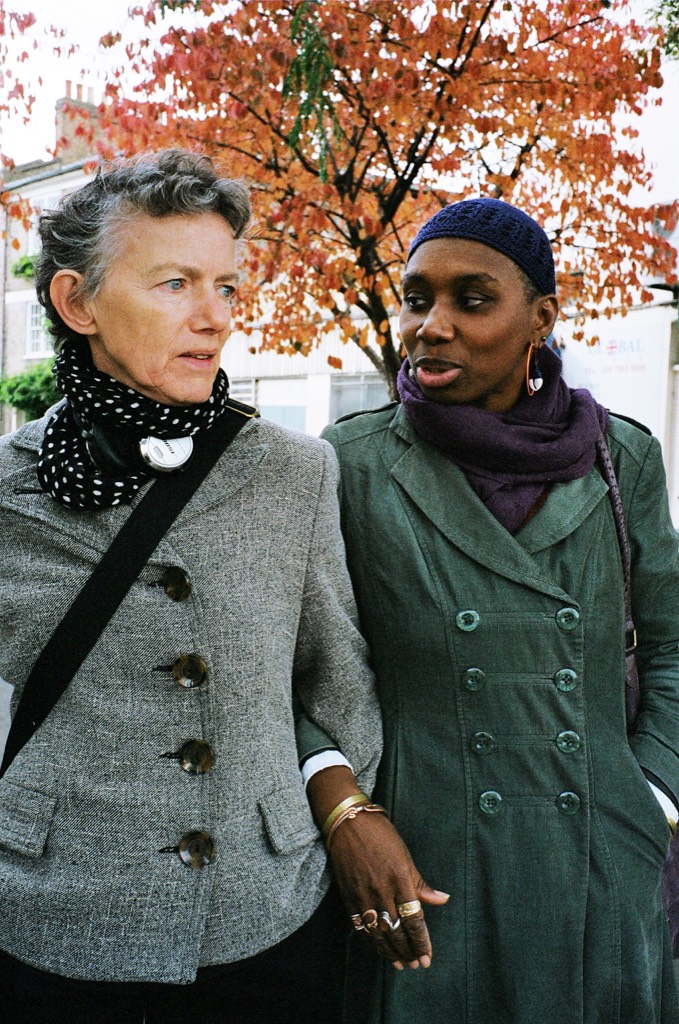Bernadette Halpin & Dorothea Smartt
Dorothea: And I remember hosting Essex Hemphil, who was a really amazing, African American poet, writer, activist. And that was kind of, one of the things I remember that kind of was, that made Centerprise special really, in the sense that... So here was this kind of, like, very out black gay man, with his very explicit poetry.
Bernadette: I remember, yes.
Dorothea: Yeah. And, he did a reading at Centerprise, and it was quite a coup, you know, to have him read at Centerprise, you know.
Bernadette: The women from the kitchen were there.
Dorothea: Yes. [laughter] Yes, right. And there was, what was it, there was Rita. And then there was the other one.
Bernadette: Christine. Christine.
Dorothea: And there was another, older, black woman.
Bernadette: When the word cock came up, don’t you remember?
Dorothea: Yeah. Yeah.
Bernadette: And it came up quite often. [laughs]
Dorothea: It came up quite a lot in his work, you know. And so, there was this...
Bernadette: This extremely...
Dorothea: So what it was, it was like, so there was, there was the, kind of, people who always came to Centerprise events, including the kind of, mature black women who were...
Bernadette: Churchgoing West Indian ladies.
Dorothea: Yeah, who ran... Yeah, who ran the café, you know. And, a whole bunch of like, black gay men and black lesbians and anybody else who had heard of Essex and was, you know, there. And so it was like, it was a very popular evening, it was, you know, full.
Mary: So it was quite a cosmopolitan or diverse audience.
Dorothea: Quite a diverse audience, yeah, you know. And, and I remember standing there thinking...
Bernadette: Oh God, yes, I...
Dorothea: Oh God, Rita.
Bernadette: Yes.
Dorothea: You know. [laughs] Because, you know, his work was very, you know...
Bernadette: Explicit.
Dorothea: Explicit. At the end of the evening I went and said to, not Rita but the other woman who used to volunteer with Rita.
Bernadette: There was Christine.
Dorothea: Yeah.
Bernadette: And she said at the end of it, [West Indian accent] ‘That was very interesting.’ [laughs] ‘Very interesting.’
Dorothea: Yes. And so I said, ‘Oh, how did you feel?’ They said, [West Indian accent] ‘Him have a very nice reading voice,’ was what she said. ‘Him have a very nice reading voice.’ [laughter] And he loved it. And I remember Essex really, really, you know, enjoying that night. And, and it was just, kind of, you know, it just bought, Centerprise in that way, kind of bought together all these different kind of people, who wouldn’t necessarily have all been in the room together at the same thing.
Bernadette Halpin joined Centerprise as Publishing Project Worker in 1990. Dorothea Smartt was hired as the Black Arts Worker shortly afterwards, and they worked alongside each other in the Publishing Project during the early 1990s. Interviewed together about their time at Centerprise, Bernadette and Dorothea’s lively conversation sparks memories as they reconnect after many years.
They remember Centerprise as ‘quite a beacon in a landscape that was pretty bleak’. Alongside supporting and publishing individual writers, which Bernadette describes as ‘in a way the most sensitive thing in the world’, they organised writing and oral history workshops, author readings and film screenings at the Rio Cinema. Centerprise, especially its writing workshops, was ‘a real place of beginnings for a lot of people, where they could bring their tender new selves, new to writing, and find a kind of supportive and encouraging space’, Dorothea said.
Both women had previously worked at feminist publishing projects or bookshops: Dorothea at Sisterwrite bookshop, Bernadette at Moss Side Women’s Press and Sheba Feminist Press. They had a shared commitment to organising spaces for women, lesbians and gay men and collaboratively coordinated the popular, women-only monthly event, Word Up Women’s Café. Bernadette was MC – wearing a tuxedo to ‘look the part’ – and women would queue around the block on busy nights to get in. Every third café was for black women only, organised by Dorothea.
Centerprise was more than a job for both women: ‘It was part of your activism … part of how you lived’. They describe the difficult aspects of collective management – meetings that could be unsupportive – and the workload caused a great deal of stress. They describe how Centerprise stopped being a collective in 1993, and that the Publishing Project also closed that year. By then, funding for community publishing was no longer available and a new Literature Development Project began at Centerprise, which supported writers but no longer published.
Bernadette is an editor and writer, now working in digital advertising. Dorothea is a poet and performance artist, and Programme Manager of Inscribe, a national writer development programme for Black and Asian writers.
Interviewed by Mary Mullen.




